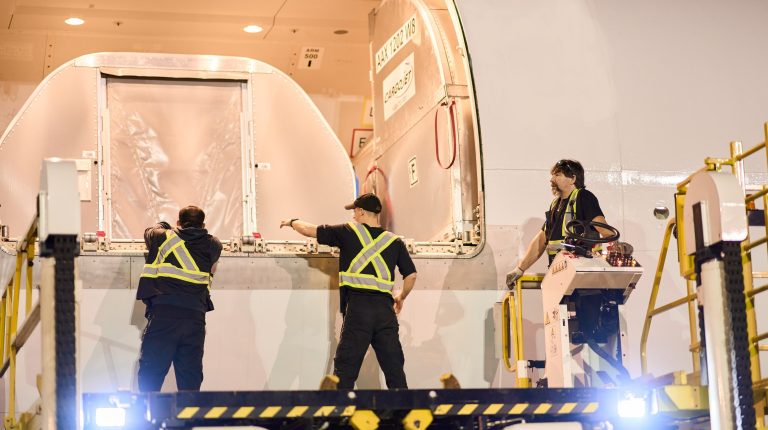Security

Cargojet maintains a Security Program that is aligned with Transport Canada regulations, the regulatory bodies of other countries, such as the U.S. Transportation Security Administration (TSA), as well as IATA in conjunction with their IATA Operational Safety Audit (IOSA) program. Cargojet continues to be compliant with the specific standards and communication protocols required by all countries in which Cargojet operates.
Cargojet has worked closely with Transport Canada on the implementation of the Air Cargo Security Program (ACSP) and Security Measures Respecting Air Cargo (SMRAC), for all aircraft moving cargo internationally and on transborder flights. Many different types of businesses participate in the ACSP working together to ensure that air cargo stays secure throughout the shipping process.
The program uses a secure supply chain approach, which helps to reduce bottlenecks at airports and keeps air cargo free from tampering while being handled at different stages of its journey. Air cargo can be screened and made secure at any point in the shipping process. This can happen as early as the time it is packed, right up until the time it is tendered to an air carrier.
Cargojet encourages all customers and business partners to apply the Transport Canada Air Cargo Security Program (ACSP). For more information regarding Transport Canada’s Air Cargo Security Program, please contact the Air Cargo Security Support Centre at 1-866-375-7342.
The TSA identifies Cargojet as a Non-US All Cargo Air Carrier, and as such Cargojet is regulated under the TSA’s All Cargo International Security Program (ACISP) for its flights operating into and out of the United States. The TSA conducts annual audits at non-U.S. locations to the United States, as well as locations in the United States to which Cargojet operates, to verify its compliance with the ACISP.
Currently, the non-US locations to the United States are Mirabel (YMX), Calgary (YYC), Hamilton (YHM), Vancouver (YVR), Winnipeg (YWG), Guadalajara (GDL), Santa Lucia (NLU), Monterrey (MTY), Queretaro (QRO), Bogota (BOG), San Pedro (SAP), Quito (UIO), San Salvador (SAL), Campinas (VCP), Guatemala (GUA), San José (SJO), Managua (MGA), Panama (PTY), Willemstad (CUR), Port of Spain (POS), Callao (LIM), (All these locations on behalf of DHL) and Bermuda. The locations in the United States to which Cargojet operates are Cincinnati (CVG) and Miami (MIA) (on behalf of DHL), Newark (EWR) and New York (JFK).
Cargojet remains vigilant in its Security Program and utilizes its participation in Transport Canada’s Air Cargo Security Technical Committee, Advisory Group on Aviation Security (AGAS), Air Carrier Security Measures (ACSM) Review Working Group and the All-Cargo and Mail Working Group to monitor upcoming regulatory changes and share best practices within the industry.
Cargojet is a certified participant of the Customs-Trade Partnership Against Terrorism (CTPAT). C-TPAT is a U.S. Customs and Border Protection (CBP) Department of Homeland Security initiative with the purpose to secure the entire supply chain, both domestic and foreign, of goods imported to the United States, against possible compromise to further enhance Canada/U.S. Border security. Participants must meet minimum security requirements and designated best practices. CBP supply chain specialists verify compliance in the United States and around the globe.
Cargojet is committed to the security of its operations, team members, and assets. The Company works with other stakeholders in the aviation industry, as well as regulators, airports, industry associations, service providers and other third parties, to ensure that the appropriate security measures are implemented in an efficient and effective manner.
